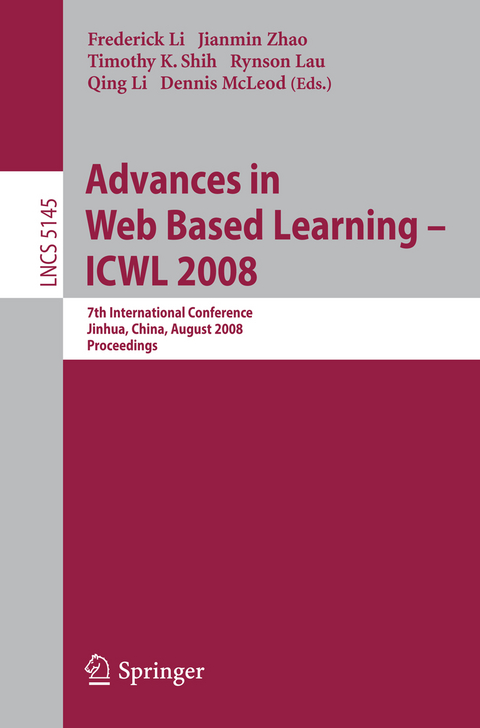Advances in Web Based Learning - ICWL 2008
Springer Berlin (Verlag)
978-3-540-85032-8 (ISBN)
Adaptation of e-Learning Technologies and Policies.- On Properly Using Technologies to Make E-Learning Effective.- Richness Versus Parsimony Antecedents of Technology Adoption Model for E-Learning Websites.- Exploring a Computer-Assisted Managing System with Competence Indicators in Taiwan.- e-Learning Issues under an Affective Perspective.- Recommendation in Education Portal by Relation Based Importance Ranking.- Learning Resource Management.- Research on Learning Resources Organization Model.- Web Contents Extracting for Web-Based Learning.- ERDRM: A Digital Rights Management System Model for Educational Resources.- Course Material Research Based on Perti Net.- e-Learning Experiences.- The Practice and Experience Sharing of Three-Year Peer Coaching Program in Taiwan.- eKnowledge Repositories in eLearning 2.0: UNITE - a European-Wide Network of Schools.- The Research on the Case Learning Activity Sustained by a Web-Based Case Assisted Study Environment-Take the Introduction of Industry System Course for Example.- An Artificial Intelligence Course Used to Investigate Students' Learning Style.- Assessment and Its Supporting Systems.- Modeling Units of Assessment for Sharing Assessment Process Information: Towards an Assessment Process Specification.- A Method to Find Learner's Key Characteristic in Wed-Based Learning.- Computer-Aided Generation of Item Banks Based on Ontology and Bloom's Taxonomy.- Motivating Students through On-Line Competition: An Analysis of Satisfaction and Learning Styles.- Tools and Experiences for Learning C Programming Language.- Collaborative Learning Tool Applying to C Programming Language.- Design and Implementation of an Internet-Based Platform for C Language Learning.- Virtual Education System for the C Programming Language.-Development of Contents Improving the Effectiveness of Self Learning, for the C Program Language.- Introductory C Programming Language Learning with Game-Based Digital Learning.- Game-Based Learning.- Interactive Video Game Platform for Game-Based Learning.- Developing the Historical Culture Course by Using the Ubiquitous Game-Based Learning Environment.- From Story-Telling to Educational Gaming: The Bamiyan Valley Case.- Three Layered Thinking Model for Designing Web-Based Educational Games.- Learning Kruskal's Algorithm, Prim's Algorithm and Dijkstra's Algorithm by Board Game.- Frameworks and Platforms for e-Learning.- A Virtual Laboratory Platform Based on Integration of Java and Matlab.- Multi-agent Framework Support for Adaptive e-Learning.- Construction of Project-Based Virtual Learning Community.- Methodology for Supporting Novel Model of E-Learning Platform in Grid Architecture.- Multimedia Technologies for Learning.- Constructing a Multi-Monitor Displays System for Learning.- Digital Content Development of Folklore Artifacts and Activities for Folklore Education.- Automated Chinese Handwriting Error Detection Using Attributed Relational Graph Matching.- A New Chinese Speech Synthesis Method Apply in Chinese Poetry Learning.- On-Line Discussion Forum and Community.- Comparing the Impact of Two Different Designs for Online Discussion.- A Sociogram Analysis on Group Interaction in an Online Discussion Forum.- Another Dimension of Web-Based Learning: Psychological Bestirring.- Construct Teacher Community in E-Learning System.- The Design and Implement of Knowledge Building Classroom Based on Web2.0.- Collaborative Learning.- An Online Theme-Based Collaborative Learning System.- Design on Collaborative Virtual Learning Community and Learning ProcessVisualization.- The Design of Web-Based Personal Collaborative Learning System (WBPCLS) for Computer Science Courses.- Semantics and Ontology.- An E-Learning System Engineering Ontology Model on the Semantic Web for Integration and Communication.- A Semantic Grid Application for E-Learning Data Sharing.- Ontology-Based Description of Learning Object.- Interfaces for Learning Activity Designs.- Studies on Human Computer Interface Design of Chinese Mobile Phone Users.- A Flow-Oriented Visual Language for Learning Designs.- A Mulimodeling Framework for Complex Learning Activity Designs.- Question Answering from Lecture Videos Based on Automatically-Generated Learning Objects.- Mobile and Network Technologies for Learning.- An Overview on Mobile E-Learning Research of Domestic and Foreign.- A Semiautomatic Content Adaptation Authoring Tool for Mobile Learning.- An Optimized Scheme for Mobile Learning on IP-Based Network Using SIP.
| Erscheint lt. Verlag | 30.7.2008 |
|---|---|
| Reihe/Serie | Information Systems and Applications, incl. Internet/Web, and HCI | Lecture Notes in Computer Science |
| Zusatzinfo | XIII, 554 p. |
| Verlagsort | Berlin |
| Sprache | englisch |
| Maße | 155 x 235 mm |
| Gewicht | 854 g |
| Themenwelt | Mathematik / Informatik ► Informatik ► Theorie / Studium |
| Mathematik / Informatik ► Informatik ► Web / Internet | |
| Informatik ► Weitere Themen ► Hardware | |
| Schlagworte | adaptive e-learning • agent learning • animation design • Blended Learning • Case-Based Learning • Clustering • collaborative computing • Collaborative Learning • Computer Networks • concept maps • courseware management • Distance Education • Distributed Systems • E-Learning • Hardcover, Softcover / Informatik, EDV/Internet • HC/Informatik, EDV/Internet • Intelligent Tutoring Systems • Interoperability • learning • Logic Programming • Mobile Learning • model-driven development • Multi-agent Systems • Multimedia • Multimedia Retrieval • Neurolinguistisches Programmieren (NLP) • NLP • Ontology • personalization • programming • Programming language • Recommendation Systems • security • Semantics • semantic web • Tools • Visualization • Web • web-based learning • Web Based Training • Web Services |
| ISBN-10 | 3-540-85032-5 / 3540850325 |
| ISBN-13 | 978-3-540-85032-8 / 9783540850328 |
| Zustand | Neuware |
| Haben Sie eine Frage zum Produkt? |
aus dem Bereich




